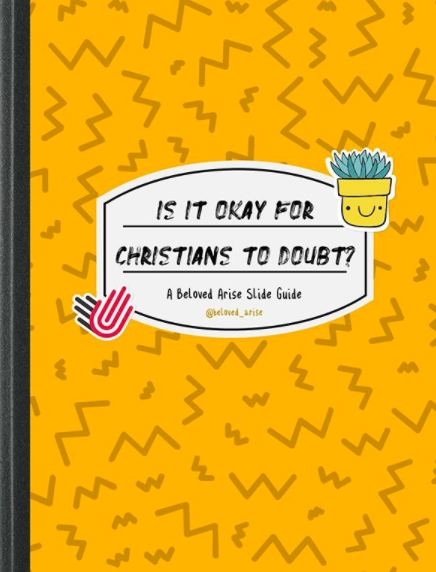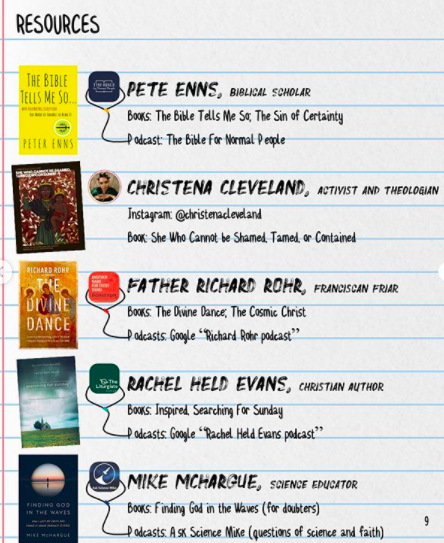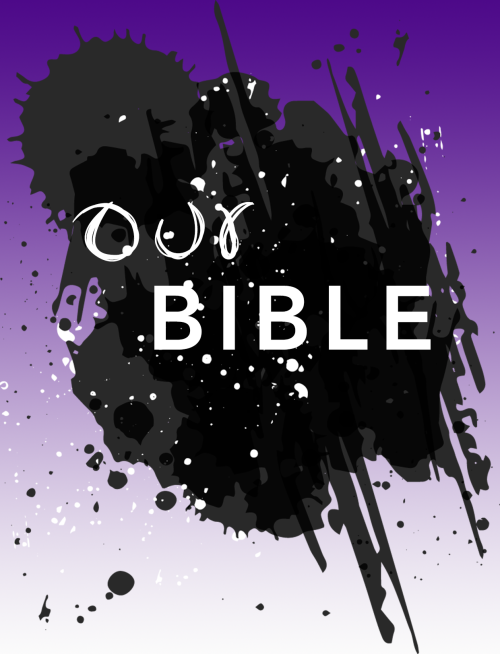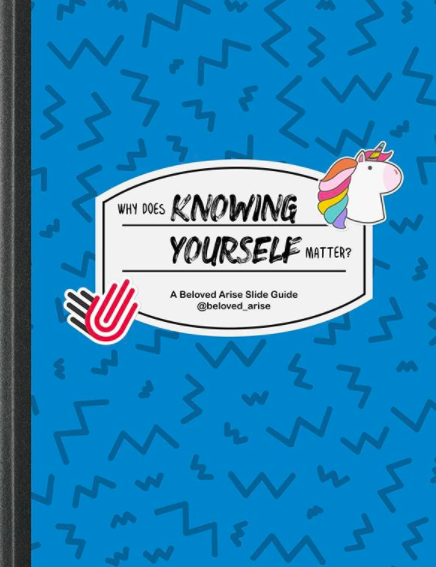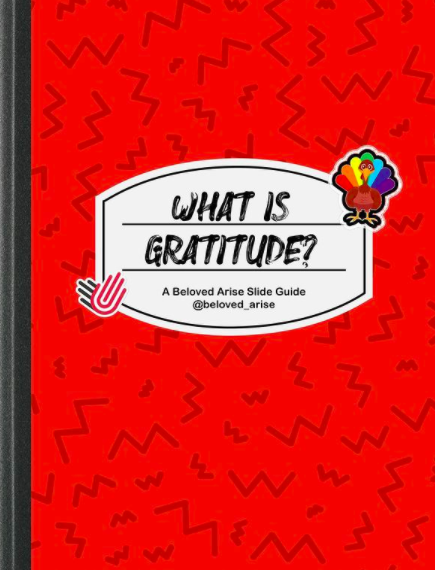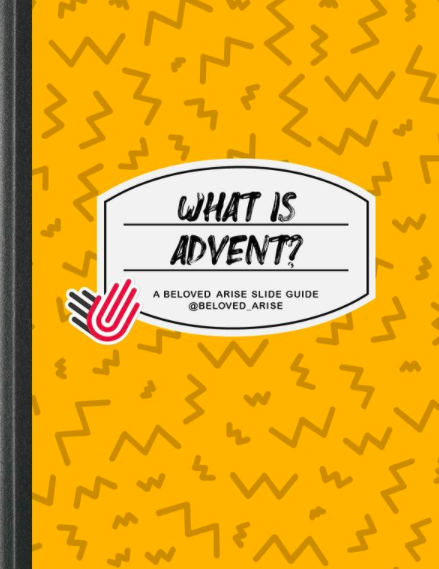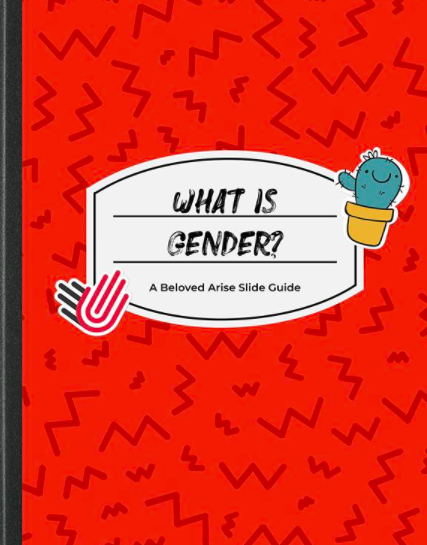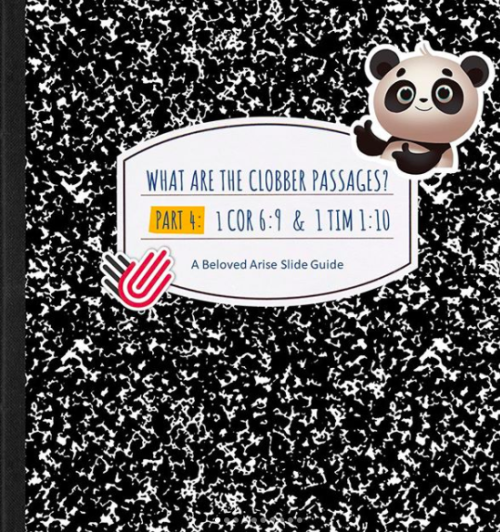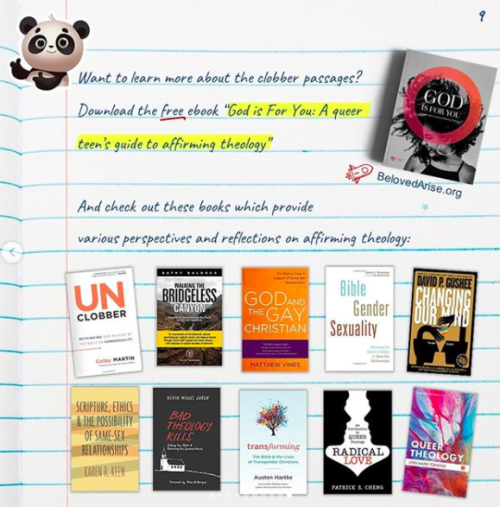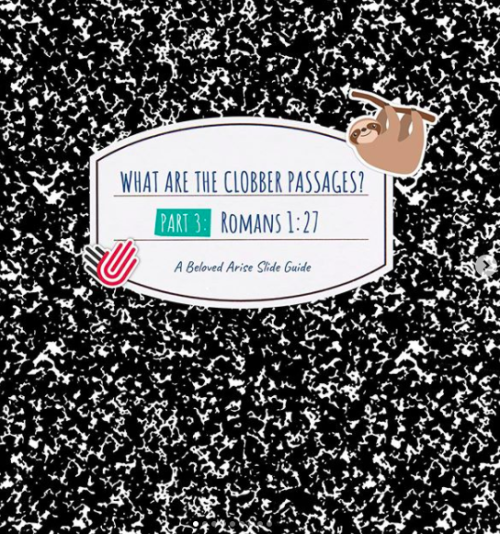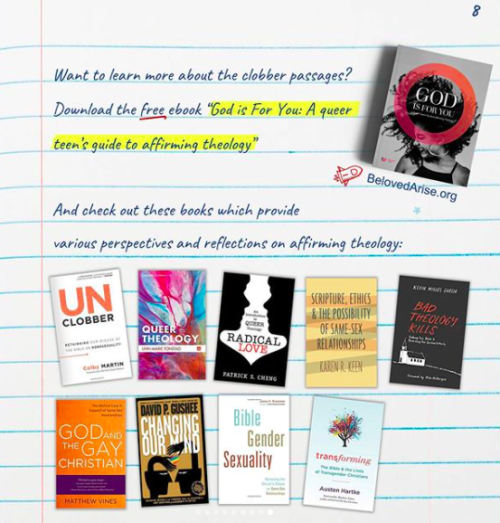#lgbt christian
Is It Okay For Christians To Doubt?
Many of us are taught that in order to be a strong Christian, we must have unshakable faith and be certain in our beliefs. But this creates a culture of shaming doubt, and millions* of Christians who experience doubt fear that they can’t be open about their faith. Maybe this is you. But what does the Bible really say about faith, doubt, and questioning?
*One 2017 study from Barna indicated more than half of Christians!
What Do These Words Even Mean?
In the New Testament, the word “believe” is a translation of Greek [image 3] (pisteúŌ, meaning to trust).
Like how you “believe in” or “trust in” your friend. Similarly, both “belief” and “faith” are both translations of [image 4] (pistis, meaning trust).
The words “belief” and “faith” aren’t wrong, but we’ve been using them so long they now have specific religious connotations that can limit our understanding. Thinking about it as our TRUST in God offers us a fresh perspective: it’s less like a thing we can possess (faith/belief) and more like a RELATIONSHIP WE LIVE (trust).
The Bible is a Communal Text
Speaking of relationship, there’s a relational contrast between Scripture’s original readers and us: while we today are extremely INDIVIDUALISTIC, they were a COMMUNAL culture.
The peoples in the Bible used their Scriptures to question and discuss how to worship God and live a good life AS A COMMUNITY. Of course it’s still good and fruitful to read the Bible on your own, but they knew the fruit is riper when harvested collectively. And while we often assume Scripture has the single unchanging answer, they quoted it to voice various perspectives within their communities, which changed with the changing times.*
*Just like healthy relationships do!
Biblical Examples
We see Jesus doing this reinterpretation among his own communities. He raises questions about how the Scriptures are interpreted and often disagrees with his fellow Jewish scholars.
Paul also does this, in one instance arguing strongly with Simon Peter,* which shows us that from the beginning of Christianity, questioning how we should live our faith (and even disagreement!) is a part of the tradition!
So how does doubt fit in?
*Galatians 2:11-14
The Wisdom of Doubt
It’s been said the opposite of faith isn’t doubt, it’s certainty. Doubt calls our attention to what doesn’t feel right, urging us to challenge what we think and look deeper than what’s on the surface. Doubt offers us questions which we can voice in a community* (just like Jesus and Paul and those before them!). And when we listen to our doubt, we give our TRUST opportunity to grow.
*ideally in a safe, open, curious community
A Nonbinary Way of Faith
The same binary way of thinking which dictates that everyone must be either male or female — this same binary mindset demands we choose between doubt and faith. But maybe our doubt is the Holy Spirit’s whisper that Christ’s good news is more inclusive and nonbinary than we ever imagined. God loves us all for our genders, our sexualities, and our curious questions, doubts, and changing beliefs.
Divine and Human, Trust and Doubt
When we (mis)use the Bible like proof that we’re right or an emotionless instruction manual, we miss so much of it’s nuanced wisdom and cheapen it’s artistry. The complex beauty of Scripture is that it’s a DIVERSE LIBRARY OF BOOKS, INSPIRED BY GOD AND WRITTEN BY PEOPLE. It is profoundly divine and thoroughly human, and contains many perspectives: some confident, some questioning, some harmonious, some disagreeing — all inviting us through doubt and trust in community to love God.
Practical Tips for Doubting
- Find a safe, open, curious community to question with. (join our weekly youth group here.)
- Start following experts. While anyone can benefit from reading the Bible regardless of education, we also need historians, scientists, archeologists, linguists, theologians, philosophers, and many other sort of experts to help us interpret what we read. Many have podcasts, books, and social media! (some listed in picture 4)
- Trust that God isn’t tallying your failures or loving you because you believe X, Y, or Z. God loves you. Invite Them into your journey of doubt and faith.
To see this information in slide form, go here.
Post link
Is It Okay For Christians To Doubt?
Many of us are taught that in order to be a strong Christian, we must have unshakable faith and be certain in our beliefs. But this creates a culture of shaming doubt, and millions* of Christians who experience doubt fear that they can’t be open about their faith. Maybe this is you. But what does the Bible really say about faith, doubt, and questioning?
*One 2017 study from Barna indicated more than half of Christians!
What Do These Words Even Mean?
In the New Testament, the word “believe” is a translation of Greek [image 3] (pisteúŌ, meaning to trust).
Like how you “believe in” or “trust in” your friend. Similarly, both “belief” and “faith” are both translations of [image 4] (pistis, meaning trust).
The words “belief” and “faith” aren’t wrong, but we’ve been using them so long they now have specific religious connotations that can limit our understanding. Thinking about it as our TRUST in God offers us a fresh perspective: it’s less like a thing we can possess (faith/belief) and more like a RELATIONSHIP WE LIVE (trust).
The Bible is a Communal Text
Speaking of relationship, there’s a relational contrast between Scripture’s original readers and us: while we today are extremely INDIVIDUALISTIC, they were a COMMUNAL culture.
The peoples in the Bible used their Scriptures to question and discuss how to worship God and live a good life AS A COMMUNITY. Of course it’s still good and fruitful to read the Bible on your own, but they knew the fruit is riper when harvested collectively. And while we often assume Scripture has the single unchanging answer, they quoted it to voice various perspectives within their communities, which changed with the changing times.*
*Just like healthy relationships do!
Biblical Examples
We see Jesus doing this reinterpretation among his own communities. He raises questions about how the Scriptures are interpreted and often disagrees with his fellow Jewish scholars.
Paul also does this, in one instance arguing strongly with Simon Peter,* which shows us that from the beginning of Christianity, questioning how we should live our faith (and even disagreement!) is a part of the tradition!
So how does doubt fit in?
*Galatians 2:11-14
The Wisdom of Doubt
It’s been said the opposite of faith isn’t doubt, it’s certainty. Doubt calls our attention to what doesn’t feel right, urging us to challenge what we think and look deeper than what’s on the surface. Doubt offers us questions which we can voice in a community* (just like Jesus and Paul and those before them!). And when we listen to our doubt, we give our TRUST opportunity to grow.
*ideally in a safe, open, curious community
A Nonbinary Way of Faith
The same binary way of thinking which dictates that everyone must be either male or female — this same binary mindset demands we choose between doubt and faith. But maybe our doubt is the Holy Spirit’s whisper that Christ’s good news is more inclusive and nonbinary than we ever imagined. God loves us all for our genders, our sexualities, and our curious questions, doubts, and changing beliefs.
Divine and Human, Trust and Doubt
When we (mis)use the Bible like proof that we’re right or an emotionless instruction manual, we miss so much of it’s nuanced wisdom and cheapen it’s artistry. The complex beauty of Scripture is that it’s a DIVERSE LIBRARY OF BOOKS, INSPIRED BY GOD AND WRITTEN BY PEOPLE. It is profoundly divine and thoroughly human, and contains many perspectives: some confident, some questioning, some harmonious, some disagreeing — all inviting us through doubt and trust in community to love God.
Practical Tips for Doubting
- Find a safe, open, curious community to question with. (join our weekly youth group here.)
- Start following experts. While anyone can benefit from reading the Bible regardless of education, we also need historians, scientists, archeologists, linguists, theologians, philosophers, and many other sort of experts to help us interpret what we read. Many have podcasts, books, and social media! (some listed in picture 4)
- Trust that God isn’t tallying your failures or loving you because you believe X, Y, or Z. God loves you. Invite Them into your journey of doubt and faith.
To see this information in slide form, go here.
Post link
Hello Beloved!
Beloved Arise has partnered with Our Bible App, a community that stands for diversity in Christ. With this partnership, Beloved Arise has founded a free shelf of daily devotionals for queer youth around the world as a means to support this often forgotten (but extremely important) part of our community. This week, 3 more devotionals were added to this shelf.
Check out Our Bible App on Instagram,Facebook, and Twitter.
Download their app on IOS and Andriod here.
Gohere for more information about the new releases.
Post link
Why is Knowing Yourself So Important?
YOUR RELATIONSHIP WITH YOURSELF IS THE LONGEST RELATIONSHIP YOU WILL EVER HAVE
From birth to death, there is no one else you will talk to more, sit with more, or be with more. To engage with yourself and participate fully into discovering who you are is an act of art and beauty.
SELF-AWARENESS LEADS TO BETTER RELATIONSHIPS
Being detached from yourself can contribute to broken relationships with friends and family. The better you know and love yourself, the better you’ll be able to know and love others.
SELF-AWARENESS HELPS US NAVIGATE THE WORLD
When we operate from a centered understanding of self, attuned to who we are and what our values are, it makes a difficult world a little easier to navigate.
“Knowing” Takes Love and Wonder
“But here is the thing: it takes love to notice and to wonder. A reality where love is at the core of all things is one attuned to be seen only through eyes of love. Only when we first love do we begin to attend, to listen, to understand, to know. Why would we think that reality would disclose itself to uncaring, indifferent, suspicious “knowers”?! We can and should cultivate wonder — a posture of wonder. This is trained readiness to be astounded. The readiness is that of a lover anticipating being delighted. Such training doesn’t quell wonder; it enhances it, it broadens the range of our capacity to wonder.”
Esther Meek
Four Promises You Can Make to Yourself
- I WILL STAY CURIOUS
Take a curious posture towards yourself, open to learn something new about who you are — wondering who you might be right now. - I WILL PAY ATTENTION
Pay attention to yourself. It’s easy to fall asleep to your own desires and dreams. We can love ourselves by tuning our ears to ourselves and allowing ourselves to observe ourselves. This takes a huge amount of intentionality. You have to prioritize your needs as much as you do the needs of others. - I WILL BE CREATIVE
How you love yourself is completely unique to YOU. You are on a journey with yourself, get creative with what loving looks like to you. There is no right or wrong way and what works for loving today may not work tomorrow. - I WILL GIVE MYSELF GRACE
Life is full of ups and downs, is sometimes incredibly magical, at other times bleakly dark. The adventure of loving yourself, while beautiful, is also difficult: give yourself grace on the journey.
An Invitation to Love and Know
WHAT ARE WAYS YOU ARE ALREADY LOVING YOURSELF?
Take a moment this week to do something as an act of love to yourself.
WHO IS INSIDE YOU?
Take a moment this week to think through what “cast of characters” lives inside you. Give these characters names, qualities, and personalities — this cast of who lives inside you may shift and change through the years!
A Blessing For Knowing
To receive this blessing / it may feel like you are peeling back /
Every layer of flesh / exposing every nerve / baring each bone /
That has kept you upright. / It may seem every word is written /
On the back of something / that your life depends upon /
That to read this blessing / would mean tearing away /
What has helped you remain intact. / Be at peace. /
It will not be as painful as that / though I cannot say it will be easy /
To accept this blessing / written as it is upon your true frame /
Inscribed on the skin / you were born to live in. /
The habits that keep you from yourself /
The misconceptions other have of you /
The unquestioned limits / you have allowed /
The smallness you have squeezed into / these are not who you are. /
This blessing simply wants / all this to fall away /
This blessing — / and it is stubborn on this point / I assure you — /
Desires you to know yourself / as it knows you /
To let go / of every layer that is not you /
To release / each thing you hide behind /
To open your eyes / to see what it sees /
How this blessing has blazed in you / since before you were born /
How it has sustained you / when you could not see it /
How it haunts you / prickling beneath your skin /
To let it shine forth / in full and unstinting measure /
How it begins and ends / with your true name
Jan Richardson
To view this post in slide guide form, go here.
Post link
What Is Gratitude Anyways?
Is it an emotion? Is it a practice? Well, it’s both and more. Gratitude has been referred to as an appreciation that comes from within, it’s a tool we can use to shift our attention to the good we have, and it’s also a conscious choice we can make to return kindness back into the world.
“Be thankful for what you have; you’ll end up having more. If you concentrate on what you don’t have, you will never, ever have enough.” ~Oprah Winfrey
Are There Benefits?
Many researchers have studied the long and short-term effects of practicing gratitude. Here are some of the benefits (there are a whole lot more!):
-Helps us focus on the positive, resulting in a happier life
-Increases resiliency
-Has a positive impact on self-esteem
-Improves relationships
-Helps us become more generous, give from abundance
-Reduces depressive symptoms
-Improves sleep hygiene
-Helps the mind focus on good things, when bad comes it doesn’t feel as bad
What Does the Bible Say About Being Thankful?
The idea of thankfulness (Hebrew: yadáh) shows up in the Hebrew Bible 102 times and (Greek: eukharistÔ) shows up 71 times in the Christian Bible. It’s clear that the idea of giving thanks is a recurring theme throughout Scripture, indicating that it is a crucial part in being in a relationship with God and others.
We see this in books such as Ecclesiastes, Job, and the Psalms, where people are in various places of prosperity and suffering, yet hold to trust and gratitude toward God.
“Even though I walk through the darkest valley, I fear no evil; For you are with me; your rod and your staff — they comfort me. You prepare a table before me in the presence of my enemies; you anoint my head with oil; my cup overflows. Surely goodness and mercy shall follow me all the days of my life, and I shall dwell in the house of the Lord my whole life long.” ~Psalm 23:4-6
Even though the Psalmist is near death and surrounded by enemies, they are sustained by their gratitude for God’s presence and gifts.
Materialism
Another benefit of cultivating gratitude is it can help you become less materialistic. This world we live in is all about the next best thing, new this, new that; and in our materialism we are ravaging the earth God trusted us to take care of. Being grateful for what we have helps slow us down and appreciate the gifts God gives us like the everyday food we enjoy, the constantly-changing weather, good art and music, and the people we love.
From Transactional to Transformational
With the idea of materialism comes the idea of a transactional life, and giving to get. We often just use prayer like a transaction:
“YOU’RE SO GREAT GOD! — NOW IT’D BE GREAT IF YOU DID THIS THING FOR ME.”
But praying from a posture of gratitude turns our shallow transactional habit into a transformational relationship. Waking up and giving thanks for the gift of another day, of our breath, and of the person God is ever creating us to be — this worshipful practice of gratitude transforms us into people who love God, love ourselves, and love others.
Cultivating Gratitude
HERE ARE SOME APPROACHES TO HELP YOU ESTABLISH A PRACTICE OF GRATITUDE IN YOUR OWN LIFE!
Gratitude Journal; start a habit of writing down just a few things every day.
Write a thank you letter to your friend.
Prayer; slowly and intentionally thank God for things you appreciate.
Find your breath, slow down, and be present in the moment.
To view this in slide guide form, go here.
Post link
What is Advent?
Advent is a season of waiting for the birth of Jesus on Christmas day. It’s often an underrated and overlooked way to experience a deeper meaning of Christmas. Just as the season of Lent helps us to prepare for the full impact of the resurrection on Easter, Advent is a way for people to brace their spirits for the incarnation (God becoming a human) on Christmas. Swipe through for some more info on Advent!
First of all Advent is the beginning of the Liturgical Year on The Church Calendar which is also an often overlooked and underrated way for Christians to engage their faith. The Liturgical Year includes scripture readings, feast days, traditions, music, food and all sorts of traditions that unites Christians from all over the world regardless of their denomination or background as they follow these yearly rhythms together.
Practices like Advent and following the Liturgical Year are particularly important to us at Beloved Arise because we are an ecumenical Christian organization. Ecumenical is a fancy way of saying that we include all Christian expressions; we aren’t associated with any one particular denomination. One way we see this expressed every week is at our virtual youth group where we have Baptists, Pentecostals, Presbyterians, “Non- Denoms”, Catholics, and many more participating in our weekly virtual youth group. Collectively following The Liturgical Year connects us to our more ancient roots instead of focusing on some of the more modern expressions of Christianity that sometimes divide us.
But wait! Isn’t this supposed to be a slide guide about ADVENT!? Yes- we just wanted you to have some brief backstory and context before moving forward.
The word advent can be translated as “coming” or “arrival” and observing this season (which starts on November 29) is about anticipating the arrival of Jesus. On a more meta level it can also be about anticipating the arrival of Christ our hearts and the second coming of Jesus.
Christians from around the world celebrate Advent in a variety of ways that you probably already engage in as part of the Christmas season. Putting up a Christmas tree is traditionally a part of advent along with daily readings, special music, and even a designated traditional color- PURPLE. In many Churches around the world sanctuaries and pastors will be decked out in purple which is a royal color and is yet another way to anticipate the coming of the Prince of Peace- Jesus. There are many resources for daily advent readings, but here is one we would recommend: https://lectionary.library.vanderbilt.edu/daily.php?year=B
These days one of the most common ways of celebrating Advent is to light an Advent wreath. Advent wreaths are actually a fairly new tradition as far as Christianity is concerned. The modern Advent wreath was conceived of by a German pastor named Johann Hinrich Wichern in 1839 and involves the lighting of a different candle each Sunday along with daily readings. The Advent wreath is loaded with symbols and meaning that we encourage you to look up, but the most obvious symbol is the slow steady emergence of light in darkness.
Advent traditions and celebrations are just like Christmas traditions in that there is always a surprising depth and richness to these practices that get lost in the modern commercialization of our sacred traditions. There is a deep well of traditions and practices to help guide your experience of Advent that will most likely enhance your experience of Christmas, but we are also invited to add our own traditions to this season as well. Whatever you can do during this time to cultivate a sense of waiting and anticipation for the celebration of the birth of Christ is a way for you to more deeply engage with the spirit of the season and join the global Church in a yearly practice.
Beloved Arise wants to invite you to join us this year in observing Advent. Let’s collectively join together in anticipation of Emmanuel- God with us. It is this message of hope that fuels our call to spread a message of hope and affirmation to queer youth of faith all over the world. God’s love is for everybody and ultimately the message of Christianity is that God broke through the forces of darkness and evil to communicate to spread hope and love to every human and that’s the message that we exist to amplify.
We’d like to conclude this slide guide on Advent with an Advent poem from Rowan Williams who was the Archbishop of Canterberry from 2002 to 2012.
He will come like last leaf’s fall.
One night when the November wind
has flayed the trees to bone, and earth
wakes choking on the mould,
the soft shroud’s folding.
He will come like frost.
One morning when the shrinking earth
opens on mist, to find itself
arrested in the net
of alien, sword-set beauty.
He will come like dark.
One evening when the bursting red
December sun draws up the sheet
and penny-masks its eye to yield
the star-snowed fields of sky.
He will come, will come,
will come like crying in the night,
like blood, like breaking,
as the earth writhes to toss him free.
He will come like child.
To view this in slide guide form, go here.
Post link
What is Gender?
1: GENDER IS A COMPLEX THING. Essentially gender is our internal relationship to societal concepts of masculinity and femininity.
2. GENDER EXPRESSION is the behavior attributes and symbols that indicate and perform one’s gender(s).
3. PART OF IT HAS TO DO WITH how you feel, part of it is how people see you, part of it has to do with expectations based on biological sex. Frankly, no definition of gender really gets all of what it is or isn’t.
4. MANY PEOPLE IDENTIFY WITHIN the binary of man or woman, many have a fluid experience within the spectrum, and still many identify outside the spectrum of these two options altogether.
5. CISGENDER PEOPLE identify with the gender society prescribes them at birth based on external sex characteristics.
TRANSGENDER PEOPLE internally align with gender(s) other than those assigned at birth.
Even Biological Sex Is NOT A Binary
The terms “MALE” AND “FEMALE” are used to categorize the anatomical differences in our bodies, but everything we attribute to biological sex— chromosomes, horomones, sex-linked genes, and genitalia— all exist on a complex spectrum. We are taught that XX chromosomes means female and XY chromosomes means male, but someone with XX chromosomes can be born with a penis and someone with XY chromosomes could be born with a vagina. Other chromosomal combinations exist (including X, XXY, XXX), and many people are born with varying degrees of both ovaries and testicles. This diversity has come to be generalized as “intersex” (neither male nor female). Tragically, doctors in many parts of the world perform irreversible surgeries to assign a binary sex to children whose bodies don’t match traditional understandings of male and female anatomy.
//For a descriptive thread on why biological sex is not a binary, visit https://threadreaderapp.com/thread/1207834357639139328.html
Gender vs Orientation
BEING TRANS IS NOT THE SAME THING AS BEING GAY.
Who you are sexually or romantically attracted to is separate from your gender. Many people confuse the two.
“When I first came out as a lesbian in college, my friends assumed I must feel like a man on the inside because they couldn’t imagine two women loving each other.”
“Growing up, everyone assumed I was gay because of my personality and how I dressed, but that was because they didn’t have the language for gender diversity. To them, everything queer had to be gay.”
Brief History of Gender Diversity
While most of the western world is only just waking up to the diversity and complexity of gender, many cultures around the world and throughout time have recognized transgender and gender nonconforming people, often giving them spiritual reverence.
Ancient Egyptians identified three genders, man, sekhet, and woman, as early as early as 2000 BCE. Other cultures acknowledge three, four, and even more genders.
THE MODERN EMPHASIS ON GENDER as a rigid binary is primarily the consequence of European colonialism: a Christianity of patriarchy and cis-normativity allowed European colonists to call other cultures primitive and justify violence against them along with other forms of theft and control.
The Importance of Pronouns and Names
There’s so many options for pronouns: he, she, they, ze, or even just using a person’s name, and more. THE WORDS WE USE TO GENDER PEOPLE MATTER.
Calling a transgender person by their birth name, or a previous name associated with an identity that is not authentic to them can be harmful. Often times trans people choose a name that aligns more with their identity. Their previous name is sometimes called their “dead name.” DON’T DEAD NAME PEOPLE.
Using a person’s chosen name and proper pronouns can REDUCE THEIR RISK OF SUICIDE BY 30%.
FUN FACT: the singular ‘they’ has been used as a gender neutral pronoun in English for many hundreds of years!
God is Not a Man
God is infinitely more complex than can be contained within human vocabulary and thoughts (see Isaiah 55:8-9).
THIS INCLUDES GENDER. God’s fullness includes woman, man, non-binary, and being outside of gender. The gender-diverse nature of God is reflected throughout scripture. In addition to masculine terms, God is repeatedly described as a nursing, protective, and comforting Mother who has born us from Her womb (Hosea 11:3-4; Deuteronomy 32:11-18; Isaiah 42:14, 49:15, 66:13; Psalm 131:2; Matthew 23:37; etc). Even Genesis 1:27 says all of humankind was made in God’s image (not just cisgender men).
In the Beginning
The Bible says that in the beginning, God created day and night, land and sea, birds and fish. But have you ever seen a sunset, or a beach, or a penguin? Well, trans and non-binary people are kind of like that. A BEAUTIFUL ARRAY OF DIVERSITY.
So, God created male and female, and we are no less beautiful, diverse, and wild than a sunset or a beach or a penguin. God created people with genders beyond male and female in the same way God created realities in between, outside of, and beyond these others. Trans and non-binary and agender and intersex: God created us.
–Adapted from a message from trans pastor Asher O’Callaghan
To see the post in slide guide form, go here.
Post link
Today (12/1/20) is World AIDS Day. Today is a day to grieve the lives lost, to feel your anger and disappointment with the government’s handling of queer issues. Today is an emotional day for all of the queer community, young and old. However, in this day of “negative” emotions, remember that despite our lack of outside support and devastation of the queer community, remember that AIDS brought us together, brought ud to fighting, and strengthened our community.
LGBTQ+ Allyship is a Process
You’ll never know it all and you’ll never be perfect. But following the lead of your LGBTQ+ friends to CHALLENGE DISCRIMINATION is a vital way to show your love for all people. Most queer people will agree there are “allies” and then there are FABULOUS ALLIES! How can you live the love you proclaim? Here are 10 suggestions from Beloved Arise volunteer, Stephen Cowden, one of our favorite fabulous allies!!
10 Ways to be a Fabulous Ally to LGBTQ+ People
01: LISTEN, LISTEN, and LISTEN.
If you are cishet, don’t assume you know what it’s like to be queer. Make a habit of listening to LGBTQ+ voices.
02: AMPLIFY LGBTQ+ VOICES.
When you speak for them, you risk speaking over them. Instead, you should elevate their perspectives.
03: REJOICE WITH THEM.
Show the queer people around you that they are valued and recognize their faithfulness.
“Rejoice with those who rejoice…weep with those who weep.” Romans 12:15
04: MOURN WITH LGBTQ+ FOLX.
Seek to understand the challenges they face. Validate the pain they feel.
05: PARTNER, DON’T PATRONIZE.
To you, LGBTQ+ inclusion may be an abstract cause. But it is very personal to lots of folx. Treat people like people rather than a cause.
06: DO YOUR OWN HOMEWORK.
Don’t expect queer folx to educate you. Allyship is not passive; you need to be proactive in your own learning and growth.
07: NORMALIZE QUEERNESS.
Put your pronouns in your social media profiles and email signatures. Use gender-neutral language. Don’t assume cisgender and heterosexual is the norm.
08: DISARM THE HATERS.
Arguing just gives them a platform, and let’s face it, many haters aren’t really open to changing their minds. Try this: respectfully acknowledge where you agree and disagree, and then move on…
09: ERR ON THE SIDE OF HUMILITY.
You will make mistakes. You will misspeak and misstep, so always be humble and willing to do better.
10: LOVE OTHERS!
“Love from the center of who you are; don’t fake it… Be good friends who love deeply; practice playing second fiddle.” Romans 12:9-10 The Message
To see this post in slide guide form, go here.
Post link
The “Clobber” Passages
Welcome to the 4th and final post on this series on the “clobber passages”—Bible verses often used to argue that queerness is sin. We’re going to combine the last two because they both say essentially the same thing. Just like the Romans passage from last time, Paul wrote some other letters to the early church, some parts of which have been used to say that LGBTQ+ people cannot enter the kin’dom of heaven. And it all comes down to two Greek words.
1 Corinthians 6:9 & 1 Timothy 1:9-10
“Do you not know that the unrighteous will not inherit the [kin’dom] of God? Do not be deceived. Neither fornicators, nor idolaters, nor adulterers, nor homosexuals, nor sodomites, nor thieves, nor covetous, nor drunkards, nor revilers, nor extortioners will inherit the [kin’dom] of God.” 1 Corinthians 6:9-10 (NKJV)
In appeal to the new church in Corinth, Paul compares believers to the outside culture. He presents a list of sinful actions to say essentially: “You’re better than this.”
“…for those who kill their fathers or mothers, for murderers, for the sexually immoral, for those practicing homosexuality, for slave traders and liars and perjurers—and for whatever else is contrary to the sound doctrine.” 1 Timothy 1:9-10
Similarly, in a letter to his friend/mentee Timothy, Paul presents yet another list of sinful actions to watch out for.
Non-Affirming View
Non-affirming folks interpret these verses as a clear, unquestionable biblical condemnation of queerness. Some assert that “homosexuals” and “those who practice homosexuality” are unrighteous just like murderers and adulterers, and LGBTQ+ people who don’t repent of these sexual sins cannot get into heaven. Some even conclude that straight Christians are also sinning just by affirming LGBTQ+ people:
“We affirm that it is sinful to approve of homosexual immorality or transgenderism and that such approval constitutes an essential departure from Christian faithfulness and witness.” “The Nashville Statement” The Council on Biblical Manhood and Womanhood
Affirming View
Affirming folks argue these verses have been mistranslated. The reality is Bible translators have interpreted these verses in 1 Corinthians and 1 Timothy in different ways. For example, the writers of the New King James Version (1979) decided to use the word “homosexual” in 1 Corinthians, but other widely accepted Bible translations decided “homosexuals” was not accurate, and instead used other words.
“Effeminate” (New American Standard Bible, 1963)
“Sexual perverts” (Revised Standard, 1971)
“Boy prostitutes” (New American Bible, 1970)
“Male prostitutes” (New Revised Standard Version, 1989)
“Sodomites” (New American, 1941)*
*Check out our slide guide on Sodom and Gomorrah for the context on “sodomy.”
It Happened in 1946
The word “homosexual” did not exist in the Bible until a group of American translators put it in there in 1946. The writers of the Revised Standard Version (RSV) were the first to mistakenly use the word “homosexual” in lieu of the Greek words “malakoi” and “arsenokoitai” in these verses. They later admitted this error and published a revision of the RSV in 1971 where “homosexuals” was replaced with “sexual perverts.” But it was too late; by then, the RSV’s (mis)use of the word “homosexuals” was adopted by other popular translations of the Bible—reinforcing an enduring societal myth that queerness is ungodly.
“Malakoi”
So let’s unpack the two Greek words the RSV mistakenly translated as “homosexual.” The first word, “malakoi,” means soft (as in clothing). When applied to people, it describes weakness, laziness, cowardice, or lack of self-control. It was a generic insult for anything considered feminine because, in those times, women were often seen as “soft” or lacking control over their desires and feelings. Affirming folks believe Paul is referring to people who lacked self-control. Here’s how one translation puts it:
“Those who use and abuse each other, use and abuse sex, use and abuse the earth and everything in it, don’t qualify as citizens in God’s [kin’dom].” 1 Corinthians 6:9-10 (The Message)
“Arsenokoitai”
The second word, “arsenokoitai,” is a very rare compound word (literally “male” and “bed”) probably made up by Paul. Because of the contexts in which Paul uses this term, affirming folks argue that Paul is referring to exploitative same-sex practices common in his time: prostitution, pederasty*, and sex with enslaved men. Affirming folks point out that loving, committed same-sex relationships between equals did not exist during this time, and therefore, Paul was NOT talking about modern same-sex dynamics, such as queer marriages.
*sex between men and boys
Conclusion
1 Corinthians 6 and 1 Timothy 1 should NOT be used to “clobber” LGBTQ+ people. What Paul condemns are abusive and exploitative behaviors—not queer identity or healthy, loving queer relationships.
As we said at the beginning of this series, there is absolutely nothing in the Bible that suggests a person’s sexual orientation or gender identity prohibits them from being a follower of Christ. These “clobber” passages, when put in appropriate context, actually reveal valuable insights for God’s people, teaching us to help the vulnerable, to care for each other, to practice the way of LOVE.
To see the post in slide-guide form, go here.
Post link
Queer people offer just as much to any church or fellowship as any straight or cis person. Arguably, we bring more to the table, having to go through hardships not understood by those outside of the queer communities.
Queer people are necessary in the church and God wants us in the church.
I want to clarify: Church doesn’t just mean that building or organization down the street. A church is any fellowship of Christ followers looking to better the world by bringing love and healing as Yeshua (Jesus) did. When Yeshua birthed the church on the cross, they didn’t just create specific organizations of people defined by the state. No, they brought us places to discuss God freely, surrounded by other believers, doing our best to understand God in our own lives.
For as Matthew 18:20 (NIV) punctuates: “For where two or three gather in my name, there am I with them.”
Therefore, from this perspective of the church, queer people have so much to offer. You are needed and wanted in the church and the world, for God has declared it so.
Go out and be Beloved!
Post link
Stay safe and make sure to social distance!
Have a spooky halloween and share your costumes with us!
The “Clobber Passages”
This is part 3 of our series on the Bible passages used by some Christians to exclude LGBTQ+ people. This next “clobber” passage from Romans is probably the one most non-affirming people refer to when they say “the Bible is clear on this…” Romans is a letter written by the apostle Paul to the Christian church in Rome. After a greeting and introduction, Paul writes about the righteousness of God, describing what life is like without God. And then the “clobber” verse…
“For this reason God gave them up to degrading passions. Their women exchanged natural* intercourse for unnatural, and in the same way also the men, giving up natural* intercourse with women, were consumed with passion for one another. Men committed shameless acts with men and received in their own persons the due penalty for their error.”
Romans 1:26-27 (NASB)
Non-Affirming View
Non-affirming Christians interpret these verses as an indictment on same-sex relationships. They assume that Paul is critiquing same-sex behavior and same-sex relationships. As such, they conclude that Paul is saying that heterosexuality is the only good and natural orientation in God’s eyes.
Affirming View
Affirming Christians, including many biblical scholars, interpret these passages as an indictment on extreme idolatry and excessive behavior. Paul is describing a group of people who have deserted God and abandoned their decree to love God, neighbor, and self. These folks have fallen into extreme idolatry and have become obsessed with their own passions and desires. When he talks about sexual behavior here, Paul is actually critiquing married heterosexual men and women, not gay people. They were so consumed by lust that they were no longer satisfied with their marriages and abandoned their natural inclination for their partners.
A People Who Have Lost Their Way
Paul is talking about people who had fallen into extreme pagan idolatry and stopped worshipping God. Romans 1:25 says “They exchanged the truth of God for a lie and worshipped and served the creature rather than the creator.” And, because of this, they did unhealthy things to each other—cheating, stealing, backstabbing, killing. And some turned sex into a meaningless act of self-gratification—no romance, no companionship, no beauty, no love. These passages are a warning (similar to the Sodom story) about what happens to communities when people lose their love for God and for each other.
“Natural” and “Unnatural”
What does Paul mean when he refers to intercourse as “natural” or “unnatural?” Does this mean that queerness is unnatural and against God’s order? Affirming theologians argue that Paul uses “natural” (physis in Greek) to mean “customary.” For example, 1 Corinthians 11, Paul says it’s natural (physis) for men to have short hair, and that men who have long hair are disgraceful.* Do Christians today conclude all long-haired men are unnatural and disgraceful to God? No, because we understand that Paul is referring to customs in his culture. Paul’s comments in Romans 1:26-27 (which uses the same Greek words) are references to custom.
*”Disgraceful” is the same word translated “degrading” in Romans 1:26.
Not Gay vs Straight, But Excess vs Moderation
“Paul is not condemning being gay as opposed to being straight. He is condemning self-seeking excess as opposed to moderation—a concern made clear by his repeated use of the term “lustful,” and by his description of “exchanging” or “abandoning” heterosexual sex.” Matthew Vines, The Reformation Project
Paul is NOT critiquing same-sex relationships; he is NOT condemning consensual, loving, committed same-sex relationships. What Paul is condemning is idolatry which has led to excessive, greedy, indulgent, love-less sexual behavior.
Conclusion
Romans 1:26-27 is a warning against idolatry, which drove a group of people to excessive behaviors, including abusing themselves and each other sexually (which falls outside the confines of their natural state.)
Romans is NOT an indictment of same-sex behavior or queer relationships. As such, these passages are gravely misused as “clobber” texts to condemn the LGBTQ+ community.
To see the post in slide-guide form, go here.
Post link
I forgot to mention how I completely feel the Holy Spirit’s presence when I’m with other gay Christians. Revoice had chosen what I thought was a fitting theme song for the weekend.
“Oh How Good” — KEITH GETTY, KRISTYN GETTY, ROSS HOLMES, AND STUART TOWNEND © 2012
Oh how good it is
When the family of God
Dwells together in spirit
In faith and unity.
This was a chosenfamily (if you will, from Grant Hartley’s talk) of God. We not only chose God, but we chose to come together in Christ and our united experiences as LGBT and SSA Christians.
Where the bonds of peace,
Of acceptance and love
Are the fruit of His presence
Here among us.
Hundreds of SSA Christians are simply not accepted at their churches. How beautiful it is to finally be in a place where He is present, and acceptancesurrounds us. This acceptance and love was what drew me to Christ, but it was also what I feared not having because of my sexual orientation. Tears from this.
CHORUS
So with one voice we’ll sing to the Lord
And with one heart we’ll live out His word
Till the whole earth sees
The Redeemer has come
For He dwells in the presence of His people.
This was the theme of the conference. We are singing to revoice what has been told to us by those who don’t understand. We are singing to our Redeemer and coming as we are.
Oh how good it is
On this journey we share
To rejoice with the happy
And weep with those who mourn.
I couldn’t help but rejoice with those who are making strides in their churches, and it deeply, deeply pained me to hear stories of oppression and misunderstanding by others. Simply hearing how Christians could simply could not come out because they were mistreated or ignored made my heart ache. (Double weeping on my part from this verse).
For the weak find strength
The afflicted find grace
When we offer the blessing
Of belonging.
Offering the blessing of belonging had a huge impact on individuals I met. A couple of them had never met another gay Christian before. I know how lonely it feels to be the only gay person in a church.
Reckless Love - Cory Asbury, Caleb Culver, Ran Jackson © 2017
I’ve sung this song dozens of times, but I never realized what it means for LGB Christians:
Oh, it chases me down, fights ‘til I’m found, leaves the ninety-nine
This to me represent’s Christ’s love for the marginalized. Roughly 4% of American adults identify as LGBT. Yet the church often forgets we exists. Christ’s love doesn’t just settle with “well, at least I have the majority.” He chases down and loves every single one of his sheep.
There’s no shadow You won’t light up
Mountain You won’t climb up
Coming after me
There’s no wall You won’t kick down
No lie You won’t tear down
Coming after me
The shadow here for me was how dark the church feels when no one’s talking about LGBT people. It took me 8 years in church to finally hear a message on homosexuality. The lie that Jesus tore down was the lie that “you can’t be gay and be Christian.” My friends came from several churches who believed this lie, and I can’t stress enough how heartbroken I am when my friends hear this lie be preached over and over.
I’m not saying that these songs were written about LGBT people, but it’s so clear to me why and how God loves His LGBT children.
The Revoice committee put together a marvelous array of thoughtful and helpful workshops. Here is just a glimpse of the ones that I went to:
How to Become Churches that Cultivate Celibacy & Mixed-orientation Marriages
Pieter Valk of EQUIP
This one opened my eyes to how much more a church can support a Side B Christian. I was lucky enough that my first church after salvation was fully supporting of my same-sex attractedness. I was on a panel two years ago at church, and a question was asked to me “How can an LGBT person feel loved and accepted in the church?”. I replied that I already feel loved and to keep doing what it was doing. Boy, was I naive.
There are 5 basic things a church can do to make LGBT Christians feel more welcomed:
- Offer God’s narrative of sexual stewardship to all people. (When we leave out a group of people, our church is not whole.)
- Talk about the reality of SSA among Christians. (Churches shouldn’t have to be affirming or non-affirming. It should be loving or loving.)
- Start talking about this at an early age. (Average time between a teen coming out to themself and to a parent is 5 years.)
- Effectively minister to LGBT+ people. (You can’t outreach to the LGBT community without making our church safe and whole.)
- Become churches where people can thrive in celibacy and MoMs:
Practical steps for cultivating celibacy
- Model it - Children must see celibate people thriving and leading.
- Teach it - The Gospel isn’t an imitation of marriage. It’s an imitation of the Trinity. Jesus didn’t lift up celibacy for only just a few people. In the New Heaven and New Earth, everyone will be celibate anyway.
- Discern it - Unless 10% of straight Christians accept the call to celibacy, how will gay Christians be celibate?
- Support it - Invite celibate people to be in the body of Christ. Don’t just have married-couple events, but have church-wide events. Small groups should be multi-generational. Celibate Christians should be invited to a nuclear family. Go as far as inviting them into nuclear homes for dinners, vacations, and even habitation. Form celibate households (like contemporary monasteries?). It shouldn’t just take 2 people to raise 4 kids. It should take the whole village.
- Celebrate it - There are already so many celebrations for couples. Let’s highlight and celebrate our celibate brothers and sisters. Hold ceremonies for vows of celibacy.
Practical steps for cultivating mixed-orientation marriages
- Normalizethem - They are common and beautiful for those called to them. They were pushed for in the 80s-2000s, and pushes against in the 2000s-2010s. We only heard about the bad MoMs, but the good MoMs need to be cultivated and talked about more.
- Teachaccurately about marriage - which is emotional intimacy, vulnerability, commitment, and possibly raising children together. It isn’t necessarily about sexual attraction, romantic fulfillment, or companionship (and even secular sex therapists would agree about that).
- Amplifytheir stories - MoMs contain both beauty and brokenness.
- Cultivatecelibacy - a reminder that celibacy is an option instead of MoMs so that people don’t feel forced into MoMs.
If your churches are struggling to maintain Side B Christians in your church, this can help start a conversation. (Most of my notes just copied from Valk’s workshop).
Race and Intersectionality
I wasn’t planning on going to this panel, but I didn’t realize how much I needed it. (I’m not a racial minority. I don’t have any struggles about my race, right?) Intersectionality is the concept that the experiences and prejudice of one class of people is not enough to encompass a person who intersects from another class of people. Let’s dive in:
First we touched upon the differences between how cultures “come out.” White people expect a narrative of fear or misunderstanding, like how coming out is displayed on the big screen. Sueann Shiah recounted that her parents were quite nonchalant about it (Taiwan was the first Asian country to legalize same-sex marriage).
We then touched upon different viewpoints. Similar to Ron Belgau’s sentiment in the preconference, you can find unlikely allies with friends who have differing points of views. It keeps you in check, and people value those opinions.
In terms of the intersection between queer and Christian, I was relieved when I was reminded that there is no how-to guide to be a queer Christian. Sueann had to learn where her moral boundaries were by either pushing the boundary too far or sticking too close. I’ve been sort of doing the same thing these past few months. I was careful to make sure that I know the consequences of pushing boundaries.
We made the distinguishment between God’s law and man’s law. Sometimes it’s easy to blend the two. But it was at this panel I felt a tugging in my heart. I was assured that the image of God was goodness and that my heart for justice is from God. Of course, I was wary of how far I can go for social justice. The best piece of advice is: Do not invest in people who are not willing to invest in you. Likewise, do not try to teach people who you are not willing to learn from.
LGBT Culture and History
Grant Hartley deserved the standing ovation given after his workshop. Topic hotly debated, I am proud of his contribution to our LGBT Christian culture. Here’s a sneak peek before the video goes public:
- Sexual minorities (or LGBT+ SSA people) have unique needs and gifts.
- Sexual minorities produce a culture of belonging (that isn’t necessarily sexual).
- They have good, bad, and redeemable aspects, which are complex.
I want to focus on what he found about the second aspect of sexual minorities in history. Several LGBT groups throughout the decade were actually opposed to the overt sexualization of their communities. These include activists groups like the Mattachine Society (1950). In fact, the largest mass shooting of LGBT people in the US was in New Orleans in 1973. These people were attending a regular church meeting at a gay bar.
Unfortunately, entities like Anita Bryant, Jerry Falwell, and the Moral Majority used fear to silence and ridicule my people. I realize these victims were my ancestors - fighting and living to make America better for me. I owe my life to these strong members of my Chosen Family.
Here are my (scattered) closing thoughts from Revoice:
You should be loved as you are. Not as you should be.
Typically missionaries need to research a foreign country in order to love them. Straight Christians should do the same for LGBT people.
Likewise, God doesn’t call just one tongue to confess his name. God’s love needs to be shared in a person’s native language. LGBT people need to be in ministry.
People need to understand the different levels of coming out. There’s living “out and proud”, and there’s choosing life or death.
Churches need to separate sexual integrity/addiction ministries with sexual minority ministries.
Hugs are good. (I’m not trying to be silly. There is an important why God designed physical touch.)
And lastly, the burden of figuring out how to be an LGBT Christian shouldn’t be on the LGBT Christian. Allies should walk with us through our burdens, and this form of love trickles down to all Christians. Leaders should be calling out other leaders who are being ignorant of us. There should be public repentance if anyone uses the Lord’s word against us. We are simply examining and defining our lives, just as anyone else is, and we want to live our lives because God loved us.
Revoice was the first ever national conference that supports LGBT Christian who wish to live out a traditional sexual ethic. Spiritual Friendship is a community of several “Side B” Christians who want to explore ways to live out their faith in a way that is unique to their experiences. Here are some of my takeaway points from the Spiritual Friendship Pre-conference and Revoice Speakers.
Ron Belgau
My main takeaway points are introducing what spiritual friendship is. He mainly used David and Jonathan as an illustration of a committed friendship. These two men not only committed their lives, but also the lives of their kin, to one another. He emphasized how society can only see love in romance, but not in friendship. Christians in America need to look at how God views friendship if they want to learn to accept new ways to live out a life of love.
Johanna Finegan
This woman knows what’s up. She starts off reminding the audience that most people assume everyone wants to be fulfilled sexually and romantically. That’s what makes Side B gay Christians uncomfortable because it makes them feel like their choice to be celibate is wrong. “Homosexual” doesn’t mean a person is sexual. These Christians are just asking for pastoral care that is specific to their needs. Being a minority in the church means a lot of what is said in the pulpit will not apply to you. This group is shoved into the corners and into the shadows. Then the group meets at a conference in St. Louis and is surprised to learn that they are not alone in their experiences at church. In fact, we shouldn’t be shoving these people in corners. We should be looking to see how God is using those who are surrendering their sexuality to Him. These Christ-lovers are simply saying that there is something more worthy than their sexual and romantic lives.
To a critic who thought rejecting the call to marriage wasn’t manly, she responded that there is nothing unmanly about refusing to marry a woman by believing he won’t be a gift to her, than marrying in order to self-indulge, to hide, and to find passive acceptance in the church. Mic drop.
Brother Trout
Coming from a different perspective, Brother Trout shared his experiences about the changing values of morality from the present to future generations. As a high school teacher, he noticed that the “You can do anything you want to do!” mantra was causing kids to feel burdened, directionless, unsuccessful, unsure, and - in the end - complacent. On the flipside, limits (such as the limits that come with celibacy) define a clear narrative we can strive for. I was more struck by how much I could relate to the negative effects of that mantra.
Eve Tushnet
I was yearning to see a convert in the gay Christian community, and I’m glad to see this representation on stage. A “convert” is a Christian who didn’t grow up in the church but chose to follow Christ later on in life (that’s me!). Tushnet was shocked at why it was easier for gay converts to learn to praise Jesus than gay people who grew up in the church. Like others from the Spiritual Friendship blog, Tushnet was able to elevate the meaning of friendship by giving examples of David and Jonathan, as well as Ruth and Naomi. Straight Christians are afraid of the word “same-sex love”, but there it was in the Bible. It’s time to explore what God was trying to say with this form of friendship.
Ray Low
Yaas Asian American representation yass. “Life isn’t about what you can take from the world. It’s about what you can give.” I wholeheartedly agree with Low. The church NEEDS our voice. I owe it to him to kickstart me on this journey to share what I’ve learned with the world. I have something to say now, and I have an entire community who will back me up.
I just needed a place to dump my notes and thoughts from the conference. The Side B community needs to be heard, and the Church needs to support them. If you’d like to listen to these individuals who are leading the Side B dialogue, listen to their keynotes here.
HE HAS RISEN
You don’t need to fit into gender normality is order for God to love you. He already loves you.
“Do not be conformed to this world, but be transformed by the renewal of your mind, that by testing you may discern what is the will of God, what is good and acceptable and perfect.”
Romans 12:2
Queer people are blessings
Queer people are blessings
Me seeing a church with a rainbow flag

“None-affirming Christians often think of same sex orientation as a mere code for the word for disordered or sinful sexual desires, but that perspective overlooks a critical aspect of what it means to be gay. Sexual orientation involves much more than just sexual attraction. For both gay and straight people, it also encompasses our capacity to channel our physical attractions into a lifelong covenant with another person”
God and the Gay Christian
By Matthew Vines
Go outside today and see how beautiful God’s creation is
Love could not be wrong because God is love.
Love the person that God made you to be.
God loves diversity in His church
“For just as the body is one and has many members, and all the members of the body, though many, are one body, so it is with Christ. For in one Spirit we were all baptized into one body—Jews or Greeks, slaves or free—and all were made to drink of one Spirit. For the body does not consist of one member but of many. If the foot should say, “Because I am not a hand, I do not belong to the body,” that would not make it any less a part of the body. And if the ear should say, “Because I am not an eye, I do not belong to the body,” that would not make it any less a part of the body. If the whole body were an eye, where would be the sense of hearing? If the whole body were an ear, where would be the sense of smell? But as it is, God arranged the members in the body, each one of them, as he chose. If all were a single member, where would the body be? As it is, there are many parts, yet one body. The eye cannot say to the hand, “I have no need of you,” nor again the head to the feet, “I have no need of you.” On the contrary, the parts of the body that seem to be weaker are indispensable, and on those parts of the body that we think less honorable we bestow the greater honor, and our unpresentable parts are treated with greater modesty, which our more presentable parts do not require. But God has so composed the body, giving greater honor to the part that lacked it, that there may be no division in the body, but that the members may have the same care for one another. If one member suffers, all suffer together; if one member is honored, all rejoice together. Now you are the body of Christ and individually members of it. And God has appointed in the church first apostles, second prophets, third teachers, then miracles, then gifts of healing, helping, administrating, and various kinds of tongues. Are all apostles? Are all prophets? Are all teachers? Do all work miracles? Do all possess gifts of healing? Do all speak with tongues? Do all interpret? But earnestly desire the higher gifts. And I will show you a still more excellent way.”
1 Corinthians 12:12-31 ESV





Ur existence is NOT a sin
God loves u.
Ur life has meaning.
Keep on going ur doing incredible
God is so proud of u.
Gays watch the devil wears Prada for fashion.
Lesbians watch it for Anne Hathaway.
Pls drink water
Eat food
Take a bath
Read a book
Love and take care of ur self today pls
You are more loved than u will ever know.
Hello friends I know I haven’t posted in a while but i have some taken some time to find myself and I have came to the conclusion that I am bisexual. I am still a very proud lgbt+ Christian and I look forward to making posts again, thank you all for your support I really appreciate it God bless ❤️❤️
“When you pass through the waters, I will be with you; and through the rivers, they shall not overwhelm you; when you walk through fire you shall not be burned, and the flame shall not consume you.”
Isaiah 43:2
“"Therefore do not be anxious about tomorrow, for tomorrow will be anxious for itself. Sufficient for the day is its own trouble.”
Matthew 6:34

